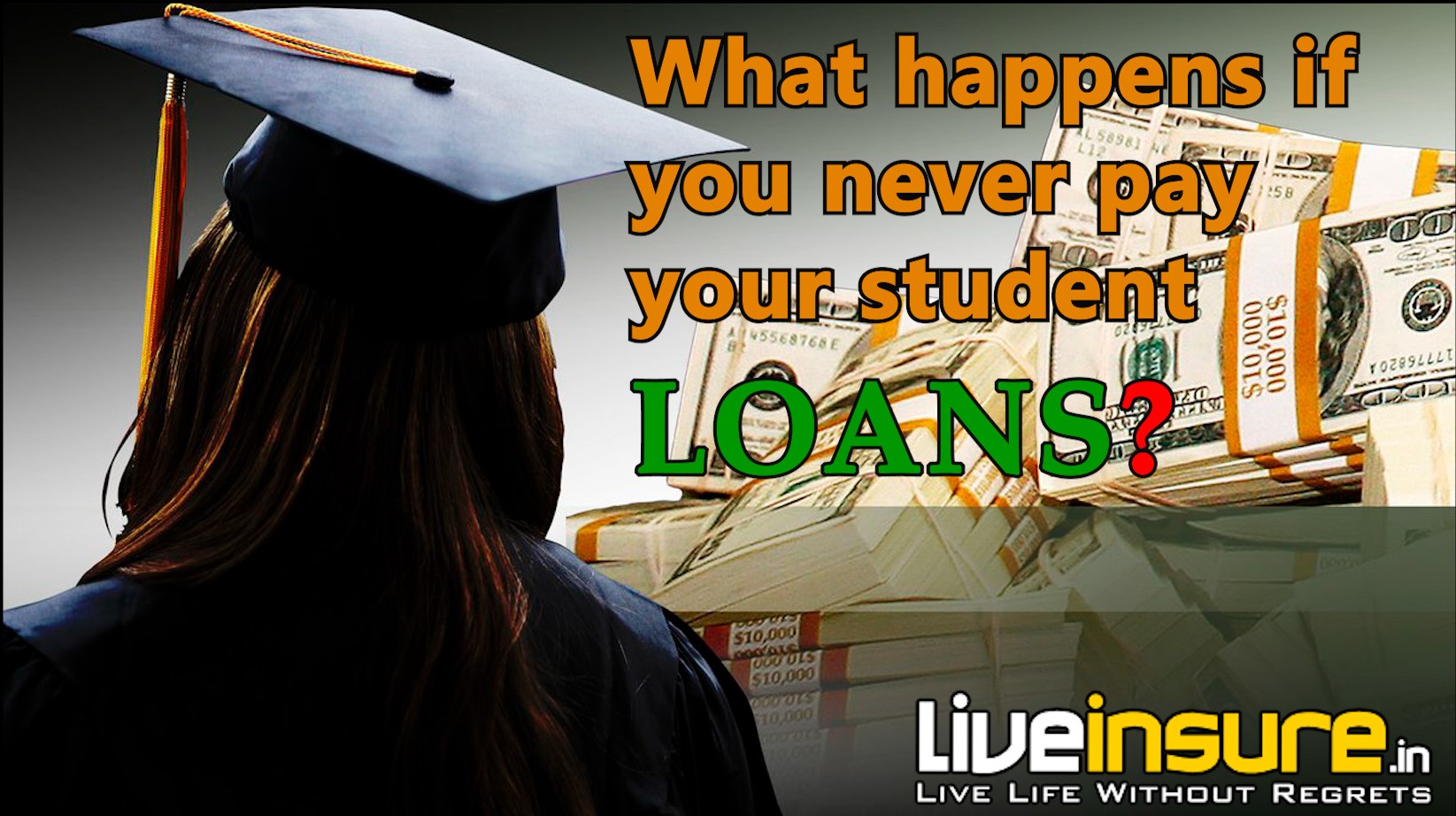Not paying student loan debt drops your credit score and, if left unchecked, could lead to money being taken from your paycheck, bank account, and tax refund. Plus, it can stop you from buying a home.
“What happens if you don’t pay student loans?” The consequences of never paying your federal student loans are greater than if you skip out on your private student loans. The federal government has equipped the Department of Education with extraordinary collection powers that allow it to garnish your wages, Social Security Benefits, and tax refund, including your Earned Income Tax Credit.
Private lenders have fewer options to collect. They can ding you and your cosigner’s credit reports, but they can’t take your home, garnish wages, or dip into your bank account until they sue you and get a judgment. And the statute of limitations can expire before that happens.
Ahead, learn what happens if you don’t pay student loans and how to avoid the consequences of not paying.
Latest on student loans
- Covid-19 forbearance extended: The latest student loan payment pause moved the repayment start date to May 2, 2022.
- Private loans charged off? Learn how to get out of private student loan default.
- Borrowed loans for your kid? Read about Parent PLUS Loan forgiveness retirement options.
- Need to get out of default? The student loan rehabilitation CARES Act benefits cover your payments.
I Can’t Pay My Student Loans: What to Expect
What happens if you miss your payments is dependent on the type of student loans you have: federal or private.
Federal Loan Timeline
There are federal student loans for undergraduate and graduate students, as well as parents of college students. Today, all loans are issued under the Direct Loan Program and follow the timelines below. Note that this is outside the window of temporary payments and interest rate relief being offered due to the Covid-19 pandemic.
- Immediately following graduation. If you have direct subsidized or unsubsidized loans, you have a six-month grace period that starts after you graduate. During the grace period, you don’t have to make payments on your debt. Grad PLUS and Parent PLUS loans don’t have grace periods, but you can elect to defer your payments until six months after graduation.
- Six months after graduation. Six months after you graduate, your loans enter into repayment. You will have to start making payments on your loans according to the repayment schedule in your loan agreement. The default repayment plan has a 10-year term and fixed monthly payments.
- If payment is one day late. If you are late with a payment by as little as one day, your loan becomes delinquent. Your account will remain delinquent until you pay the past due balance and any fees.
- If payment is 30 days late. If you don’t make your full monthly payment within 30 days of your due date, your loan servicer will charge you a late fee. The fee can be as high as 6% of your late payment amount.
- If payment is 90 days late. If you’re delinquent for 90 days or more, the loan servicer will report the delinquency to the major credit bureaus: Equifax, Experian and TransUnion.
- If payment is 270 days late: Your loans will enter into default if you don’t make payments for 270 days or more.
Private Student Loan Timeline
There was nearly $130 billion in outstanding private student loans at the end of the 2019 school year, ranging from loans for undergraduate students to medical school loans. Private loans work differently than federal loans. Offered by online lenders, banks and credit unions, repayment terms can vary depending on the lender. In general, private student loans follow the below timeline:
- Immediately after graduation. Although some private loan lenders give borrowers grace periods, that’s not the case for all of them. Many lenders require you to make payments right after you graduate.
- Payment is one day late. As soon as one day after your payment due date, your lender will mark your account as delinquent and report the delinquency to the credit bureaus.
- Payment is 90 days late: Once your payment is 90 days late, the lender will consider you to be in default. They may try to collect on the debt by hiring a collections agency or taking you to court.
- Payment is 120 days late: The lender will often charge off the debt once it’s 120 days late. The lender will sell the debt to a collections agency which will handle the loan going forward.
The short-term consequences
When you’re even one day late on your student loans, you’re immediately considered delinquent. If you miss a few payments, you might face consequences such as:
- Late fees. A late payment — one you eventually make but not by the due date — could result in a late payment fee. This amount varies by lender, and not all of them institute this fee, but it’s very common to see either flat late fees or fees that represent a percentage of your missed payment.
- Withheld tax refund. If you fall behind on federal student loans, the government could withhold your refund until you’re up to date on payments.
- Wage garnishment. If you’re a few months behind on your student loans, your lender might make moves to garnish your wages — sometimes up to as much as 25 percent of your disposable income. It can do this until you’ve paid back a portion of your loans and are in good standing.
The long-term consequences
Loans are considered delinquent immediately after one missed payment, but your lender or loan servicer might not report you as late to the major credit bureaus until you’re 90 days past due. Here’s what can happen the longer you don’t pay your student loans:
- Default. After several months of missed payments, your loan will enter default. The specific timing and consequences of default vary by lender. In extreme cases, the entirety of your student loan balance immediately comes due.
- Lost eligibility for future aid. If you’re currently in default, you could lose out on any future student aid, including scholarships, grants and federal student loans. Defaulted loans on your credit report could also make it harder to buy a home, buy a car or take out a credit card.
- Credit score drop. The longer you go without paying your student loans, the more your credit score may tank.
- Potential lawsuits. Your original lender could sell your loan to a debt collection agency, which can call and send you letters in an attempt to collect a debt. To garnish wages, lenders will need to go through court. You could get sued if you don’t repay your loans.
Do student loans go away after 7 years?
While negative information about your student loans may disappear from your credit reports after seven years, the student loans themselves will remain on your credit reports — and in your life — until you pay them off. In very rare circumstances, you may be able to get rid of your student loans through bankruptcy, but in general, the only way to make your loans disappear is to finish repayment.
Better Options If You Can’t Pay
If you are having trouble paying your student loans, you should immediately contact your lender. There are a lot of options that could help you, all of which are better than just not paying your student loans.
First, you should look at changing your repayment plan to something more affordable. You could switch to IBR or PAYE, which are income-based plans that could put your payment at $0 if you qualify.
Second, if you are having a temporary hardship, you could ask to have your loans put into deferment or forbearance. This will give you a little time to regroup without having to make payments. Remember, interest will still accrue, but you won’t be required to make payments.
Finally, check to see if you qualify for any type of student loan forgiveness program. If you don’t qualify for a traditional student loan forgiveness program, you could switch repayment plans to one that includes student loan forgiveness.
What happens to student loans when you die?
Federal student loans are discharged upon the borrower’s death. This includes any PLUS loans taken out by a parent—the loan can be discharged if that parent dies. Private loans may not be as easily discharged, and the loan may have to be repaid from the decedent’s estate. Private lenders can decide how aggressively they want to pursue a debt in instances of death.
The bottom line
Not paying back your student loans can cause catastrophic results for your finances, your credit and your future borrowing prospects, so do your best to stay current on your loans.
If you’re struggling, find a repayment plan that works for you, like an income-driven repayment plan, or refinance your loans. Not paying back your student loans will hurt you for years to come, so the best course of action should be the one that gets you back on track.




